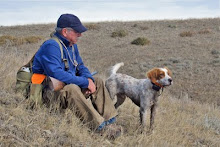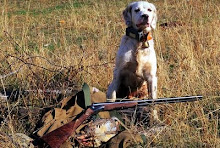After my first fall season of trialing, Mike suggested I put down a few thoughts. As folks who check out my other blog know, I have two vizslas -- one of whom is now 18mos old and who I always suspected might have the tools to both enjoy and do well in a trial format. I decided to take a half-step into the pool by entering him in a non-regular, vizslas-only Hunting Dog Stake at the end of June just see how he'd do against his peers – even if the two stakes offered were determined by skill-level rather than age. At 13mos, he was the youngest dog in the stake – and won it handily. That first blue ribbon is, as they say, addictive.
Since then we've been running in AKC events (because at least here in the northeast, they seem easier to access, especially since we're already heavily involved in the AKC hunt test format, too). Deciding to concentrate on finishing our older dog's SH hunt-test title first, we waited till early November to start trialing and have now run our younger dog in five stakes – three Amateur, two Open – with some nice successes. Our fall season just ended on Saturday. I can now relax. In the meantime, here are some observations:
*Whether hunt test or field trial, every event is only as good as its secretary and line marshal. This seemed especially true for the seven field trial events we ran in – some of which it seemed like were thinly veiled chaos, others highly oiled machines despite high numbers of dogs and limited daylight. This relates to my next observation, too, but there do seem to be a number of field-trial hosting clubs that have a high expectation of telepathy or refined intuitive learning on the part of its participants.
*People are friendly once you get to know them. All the sporting dog formats seem eager to attract newcomers – and certainly once folk had found out I was a novice, they were friendly as all heck. The two factors that kept me out of trialing at first were that it seemed pretty gear-intensive (meaning horses, trailers, tracking collars, and chaps) and that it was competitive. I've now heard and seen some of the petty horse-muck that sullies trialing (and to a lesser extent hunt testing) – and it's a shame that a few folk who can't separate their own egos from their dogs establish an uninviting stereotype. But I've also met far more really nice folk who will take my stupid phone-calls, offer horses, and maybe even scout for me when I need it. It seems to me that if trialing-focused clubs did as much outreach as some of the hunt test-focused clubs in terms of novice handler clinics then there should be plenty of folk eager to try it at least once. Being able to run in a non-regular stake and/or a breed-only stake is a great way for beginners to test their and their dogs' mettle; it would be great to see more clubs hold them.
* Trialing seems imminently more sociable. Maybe it's because host clubs wait till every stake is run in a day before announcing any placements, or because amateurs and professionals alike often run dogs in multiple stakes. Maybe it's because a good chunk of participants have hauled their dogs and horses off to the venue for the weekend -- and will be damned if they have to do that for just a day. In any case, in the hunt test world, people will very often wait around just long enough to receive their qualifying ribbons and then cruise.
*Even great dogs get beat. This is maybe all I need to say. A good dog can turn in a great run and simply get beaten by a better run. And if you're in it for the blue ribbon (or even the other colors), you're in it for the wrong reason. Believe me, I like winning a lot more – but even if it's only a fellow spectator who takes time to tell you your dog runs and hunts great on your otherwise birdless brace still makes it absolutely worthwhile. And if your dog genuinely blew it, you'll know it yourself. In which case, analyze the weak points, take heart in the strong points, train or plan accordingly and come back around.
*Derby dogs can break your heart. I'm sure this applies to all-age dogs, too, but because the expectations are a lot looser for Derby, it has been a lot less obvious to me what will necessarily carry the day for a win. And while my Derby-dog may be almost broke, and while that's not a requirement for Derby, every time I flush a bird and fire a pistol there's an adrenaline rush as to whether he'll keep standing till I can collar him off for his next cast-off – and how long it will be before he starts standing tall again with a bird beyond his nose. In a great post I re-read with frequency, Kim Sampson recalls judge Glen Wiese's rubric that "Slightly flawed brilliance should triumph over perfect mediocrity". This seems especially true for Derby. It's a roller-coaster ride, for sure.
*There's a thrill-ride to trialing that is much less obvious in hunt-testing. I am still an avid believer in the hunt-test format – even leaving aside the titles, it is a great training and testing guideline for those folk who are looking to train a finished gun-dog. And I don't believe that you have to choose trialing over hunt-testing; the skill-sets may be slightly different, but they aren't exclusive. The difference perhaps is that the hunt-test format has more of a check-list sensation to it as you progress up the levels -- 'Did the dog perform an honor?' Check. 'Did the dog retrieve?' Check – where the trial format is much more about speed, stamina, and style. And while I have seen and judged some hunt test dogs that performed beautifully, maybe it's the open spaces that come with a field-trial course that free up a dog's stride and drive its nose and its imagination. Or maybe there's a certain something else to trialing -- maybe that something that means that 'good enough' probably isn't, or the sharp contrasts between speed and stillness -- that means we'll be out again in the spring.









1 comment:
Excellent post Andrew.
Entered my first trial this fall as well after attending many and had many of the same impressions.
Looking forward to having at it again in the Spring.
Post a Comment